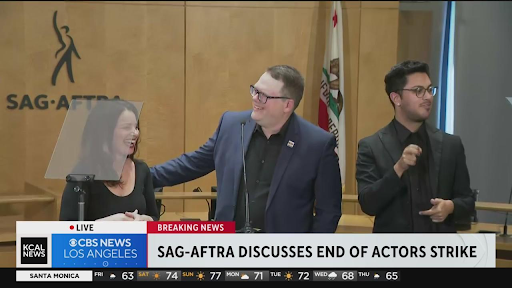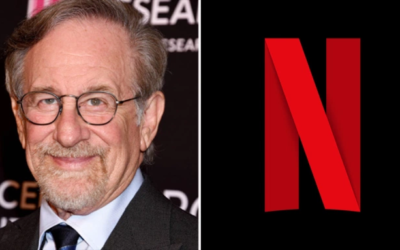Source: CBS News
For a brief period, it looked as if the Screen Actors Guild – American Federation of Television and Radio Artists (SAG-AFTRA) and the Alliance of Motion Picture and Television Producers (AMPTP) would still be unable to settle on a new contract that would end the former’s months-long strike, one that, along with the earlier Writers Guild of America (WGA) strike that had come to its own end just a short while ago, brought much of the American film industry to a standstill. Various sources claim that disagreements over the usage of AI technology, which many actors are concerned could potentially be used to replace performers without providing them with just compensation, were a major sticking point in the discussions, and had that remained the case, it’s quite possible that SAG-AFTRA’s strike could have continued into the oncoming new year. Fortunately though, that no longer appears to be the case; after some alleged revision of certain language used in the new contract, it does appear that both SAG-AFTRA and the AMPTP have finally come to a satisfactory agreement, with the former announcing an end to their strike shortly after a new contract was apparently settled on. However, if that is to be the case, there is still one crucial step that needs to be taken: the thousands of members that make up SAG-AFTRA need to look over the new contract and vote on it.
Starting Tuesday, November 14th, those who membership with SAG-AFTRA began voting on the new contract, a three-year agreement made with the AMPTP that finally brought an end to a strike that lasted for one hundred and eighteen days, one that finally ended at 12:01 AM on Thursday, November 9th after a deal was announced the day prior. It was just recently that the union’s national board of directors voted to approve the new contract, with 86% of the board opting to move forward with what has been written (perhaps not a completely unanimous vote, but one close enough to satisfaction nonetheless). Now it’s up to the remainder of the guild, a total of roughly 160,000 union members, to determine whether or not the “yes” vote holds, and with voting expected to continue until the first week of December, there’s plenty of time for them all to look over what’s been agreed to and whether or not it meets their demands.
According to SAG-AFTRA president Fran Drescher, the new contract absolutely does meet most (if not all) of the demands made by the guild, acknowledging all the various ways in which this newest deal had broke ground that had not been previously touched upon in past agreements. “We have forged the biggest deal in industry history, which broke pattern, established new revenue streams and passed a historic $1 billion-plus deal with the most progressive AI protections ever written,” Drescher claims. “I feel pretty confident in saying this is a paradigm shift of seismic proportions.” Duncan Crabtree-Ireland, the chief negotiator for SAG-AFTRA, expressed similar thoughts as he explained how this new contract addressed such concerns as streaming data and AI technology. “Once ratified, this deal will fundamentally reset how our membership is compensated to account for the growth of streaming and, for the first time, institute deep protections against the encroachment of AI technology,” Crabtree-Ireland states. “At its core, this deal is about our members and making sure they are able to maintain the dignity that comes with a career as an actor and performer.”
The newly written contract features several terms that address a wide variety of issues that currently plague the acting profession in Hollywood, but for most, there are some that are more important than others. For one thing, once the contract has been fully approved, general wages will immediately increase by 7% and will see further increases over the next two years, with these new wages and funding for benefits totalling to well over a billion dollars that will be distributed among SAG-AFTRA’s thousands of members. Second, “consent and compensation guardrails” that protect actors against the unauthorized usage of their likeness by AI technologies have been put into place; if a studio is to include a digital recreation of a given actor (whether it’s a background extra or a more popular celebrity) in any of its productions, it must first receive fully informed consent from the actor in question. Third, film and television productions designed for release on streaming platforms will now offer participation bonuses that will be added to regular residuals in compensating actors. Finally, there are the other smaller, but still essential provisions like an improvement of relocation benefits, regulation for audtions that are “self-taped”, and higher residuals for stunt performers, among several others.
The new contract is currently set to expire on June 30th, 2026, giving actors and producers roughly two-and-a-half years to adapt to the changes enforced by these new terms and determine whether or not more work needs to be done. For the time being though, it looks as if most everyone is at least somewhat satisfied with the deal that has been reached, with the AMPTP seeming to be especially eager to get new film and television productions back up and running. “We are pleased that the (union’s) National Board has recommended the agreement for ratification by the membership,” one AMPTP spokesperson claims in a recently released statement. “We are also grateful that the entire industry has enthusiastically returned to work.”
As far as Hollywood and its associated industries are concerned, there’s no such thing as a time that’s “too soon” for a return to work. With the studios being forced to a standstill since May of this year, when the WGA first began its strike and paved the way for SAG-AFTRA to begin striking just a few months afterwards, the local economy is said to have lost billions of dollars that could’ve gone to not only those directly employed in the production of films and television series, but also smaller businesses (such as restaurants and caterers) who specifically require these larger companies to provide patronage for their services. None of this will have to be worrying for much longer though; so long as the members of SAG-AFTRA vote to approve their latest contract, everyone will be able to come out of this experience better off than they were before.




